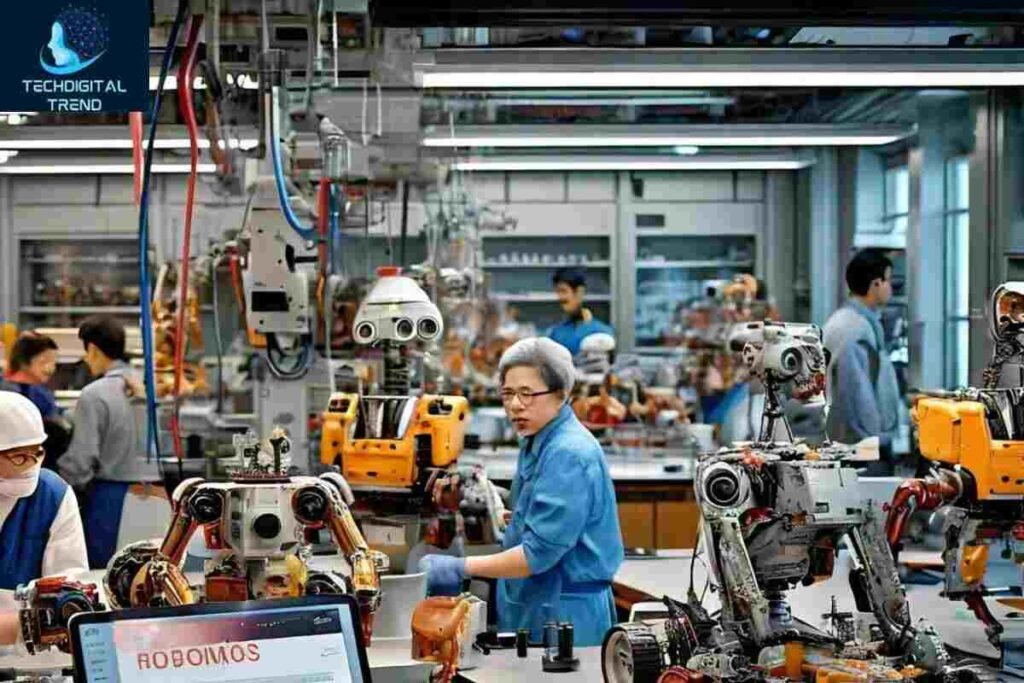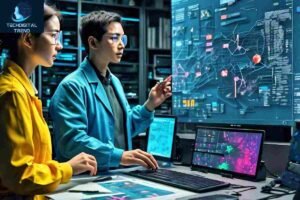Table of Contents
ToggleArtificial Intelligence: What it is and How it’s Changing
Artificial intelligence (AI) has become a buzzword in recent years, with many people wondering what it is and how it impacts our lives. In this blog post, we’ll delve into the world of AI, exploring its definition, types, applications, and benefits.
Definition of AI
The term artificial intelligence describes the process of creating computer systems that are capable of learning, solving problems, and making decisions—tasks that normally require human intellect. In many cases, AI systems are faster and more accurate than humans in making predictions, classifying objects, and producing insights using algorithms and data.
AI involves using algorithms, data structures, and software to create intelligent machines that can perform tasks that typically require human intelligence.
AI systems can learn from data, improve their performance, and adapt to new situations.
- General or Strong AI: Aims to match human intelligence and perform any intellectual task, such as:
- Reasoning and problem-solving
- Learning and adaptation
- Understanding natural language
- Superintelligence: Exceeds human intelligence by a significant margin, with possible applications in domains such as:
- scientific investigationMedical Care
AI Types
Narrow or Weak AI: Created to carry out a certain function, like:
- Recognizing faces
- Interpretation into another language
- Engaging in games such as chess
AI applications
AI is widely used in many different fields, including:
- Healthcare: AI-driven medication development, diagnosis, and tailored treatment.
- Finance: Portfolio management, credit rating, and fraud detection.
- Transportation: route optimization, traffic control, and autonomous cars.
- Education: Personalized learning, grading systems, and content creation.
Healthcare:
- AI-powered diagnosis
- Drug discovery
- Personalized medicine
Finance:
- Fraud detection
- Credit scoring
- Portfolio management
Transportation:
- Autonomous vehicles
- Traffic management
- Route optimization
Education:
- Personalized learning
- Grading systems
- Content creation
Manufacturing:
- Predictive maintenance
- Quality control
- Supply chain management
AI Benefits
- Increased Efficiency: AI systems can automate repetitive tasks and improve productivity
- Improved Accuracy: AI systems can reduce errors and improve decision-making
- Enhanced Customer Experience: AI systems can personalize interactions and improve response times
- Innovation: AI systems can drive innovation and enable new products and services
- Job Creation: AI systems can create new job opportunities in fields like AI development, deployment, and maintenance
Challenges of AI
- Data Quality: AI systems require high-quality data to learn and improve
- Bias and Discrimination: AI systems can perpetuate bias and discrimination if not designed with fairness and transparency
- Explainability: AI systems can be challenging to comprehend and use.
- Job Displacement: AI systems can automate jobs, potentially displacing workers
- Ethics: AI systems raise ethical concerns, such as privacy, security, and accountability
History of AI
- The term “Artificial Intelligence” was coined in 1956 by John McCarthy
- Early AI research focused on developing rule-based systems that could simulate human problem-solving
- In the 1980s and 1990s, AI research expanded to include machine learning and neural networks
AI Technologies
Machine learning makes it possible for AI systems to gain knowledge from data and gradually enhance their performance.
- Natural Language Processing (NLP): this lets AI programs comprehend and produce human language.
- Computer Vision: enables AI systems to interpret and understand visual data from images and videos
- Robotics: enables AI systems to interact with the physical world through robots and autonomous vehicles
AI Future
- Increased Adoption: AI systems will become more widespread and adopted across various industries
- Improved Capabilities: AI systems will become more advanced and capable of performing complex tasks
- Continued Innovation: AI systems will drive innovation and enable new products and services
- Ethical Considerations: AI systems will require careful consideration of ethical concerns, such as privacy, security, and accountability
Conclusion
AI is a rapidly growing field that has the potential to transform various aspects of our lives. From healthcare to transportation, AI has the potential to improve efficiency, accuracy, and decision-making. However, it also raises important ethical considerations, such as bias, explainability, and job displacement.
It’s critical to keep up with the advancements and uses of AI as it continues to change. We can harness AI’s strength and build a better future for all if we comprehend it.
Important lessons learned:
- Artificial Intelligence (AI) is a vast area that includes many different approaches, such as computer vision, natural language processing, and machine learning.
- Numerous industries, including healthcare, banking, transportation, and education, have embraced artificial intelligence (AI).
- AI has a number of advantages, such as better decision-making, higher accuracy, and increased efficiency.
- Important ethical issues including prejudice, explainability, and job displacement are also brought up by AI.
- It’s critical to keep up with the advancements and uses of AI as it continues to change.
Last Words:
Artificial Intelligence is a formidable technology that can change our lives.
By understanding its definition, types, applications, benefits, and challenges, we can unlock its power and create a brighter future for all. Embrace AI and stay informed about its developments and applications.
Open this link: Tap to here















